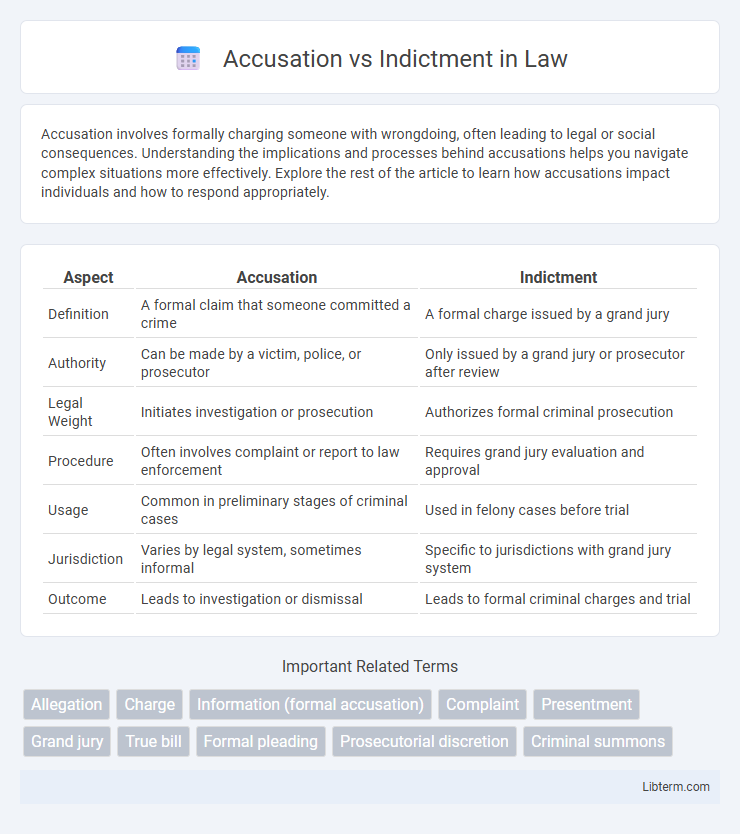Accusation involves formally charging someone with wrongdoing, often leading to legal or social consequences. Understanding the implications and processes behind accusations helps you navigate complex situations more effectively. Explore the rest of the article to learn how accusations impact individuals and how to respond appropriately.
Table of Comparison
| Aspect | Accusation | Indictment |
|---|---|---|
| Definition | A formal claim that someone committed a crime | A formal charge issued by a grand jury |
| Authority | Can be made by a victim, police, or prosecutor | Only issued by a grand jury or prosecutor after review |
| Legal Weight | Initiates investigation or prosecution | Authorizes formal criminal prosecution |
| Procedure | Often involves complaint or report to law enforcement | Requires grand jury evaluation and approval |
| Usage | Common in preliminary stages of criminal cases | Used in felony cases before trial |
| Jurisdiction | Varies by legal system, sometimes informal | Specific to jurisdictions with grand jury system |
| Outcome | Leads to investigation or dismissal | Leads to formal criminal charges and trial |
Introduction to Accusation and Indictment
An accusation is a formal claim by one party that another has committed a wrongdoing or crime, serving as the initial step in legal proceedings. An indictment is a formal charge issued by a grand jury stating there is sufficient evidence to prosecute the accused for a specific criminal offense. Accusations can be made by individuals or authorities, while indictments require a grand jury's review and approval based on presented evidence.
Defining Accusation: Meaning and Context
An accusation is a formal claim or assertion that someone has committed a crime or wrongdoing, typically made by an individual or authority without immediate legal proceedings. It functions as an initial step in the criminal justice process where suspicion or allegation is formally expressed. Unlike an indictment, an accusation does not always require evidence or a grand jury's involvement but serves as the foundation for potential investigation or legal action.
What Is an Indictment? Legal Definition
An indictment is a formal legal document issued by a grand jury that charges an individual with a serious criminal offense, establishing probable cause to proceed to trial. It serves as an official accusation that initiates the criminal prosecution process, distinct from preliminary charges or accusations by law enforcement. The indictment outlines specific allegations and ensures the defendant is informed of the charges for a fair defense in court.
Key Differences Between Accusation and Indictment
An accusation is a formal claim that someone has committed a crime, often made by an individual or authority, while an indictment is a formal charge issued by a grand jury after reviewing evidence. Accusations can be broad and informal, whereas indictments require a legal process and serve as an official step in criminal proceedings. The indictment carries legal weight, enabling prosecution, whereas accusations alone do not guarantee court action.
The Legal Process: From Accusation to Indictment
The legal process begins with an accusation, which is an initial claim that a person has committed a crime, often made by a victim or law enforcement. An indictment follows when a grand jury reviews evidence presented by the prosecutor and formally charges the suspect, establishing probable cause to proceed to trial. This transition from accusation to indictment ensures a legally sufficient basis for prosecuting the accused under criminal law.
Who Can Accuse vs. Who Can Indict
Only private individuals or victims can make an accusation, presenting claims of criminal conduct to authorities or the court. In contrast, indictments are issued exclusively by grand juries or prosecutors who evaluate evidence to formally charge a suspect. The distinction lies in the source of initiation: accusations originate from private parties, while indictments arise from official legal entities.
The Role of Evidence in Accusations and Indictments
Evidence plays a critical role in both accusations and indictments, serving as the foundation for allegations and legal charges. In the case of accusations, evidence may be preliminary or circumstantial, prompting initial claims or suspicions of wrongdoing. Indictments require a higher standard of evidence, often evaluated by a grand jury or prosecutor, to formally charge an individual and proceed with prosecution.
Consequences of Being Accused vs. Being Indicted
Being accused of a crime can lead to social stigma, reputational damage, and preliminary legal scrutiny, often without formal legal charges. In contrast, being indicted signifies formal charges by a grand jury, resulting in a higher likelihood of prosecution, court proceedings, and potential criminal penalties. The indictment carries more severe legal consequences, including bail hearings, arraignment, and potential trial, which can profoundly impact personal freedom and future legal status.
Accusation and Indictment in Criminal Law
An accusation in criminal law refers to a formal claim by a prosecutor or victim that a person has committed a crime, often initiating an investigation or legal proceeding. An indictment is a formal charge issued by a grand jury after reviewing evidence, signaling that sufficient probable cause exists to prosecute the accused. Both serve crucial roles in the criminal justice process, with accusations triggering initial charges and indictments advancing cases to trial.
Frequently Asked Questions: Accusation vs. Indictment
An accusation is a formal claim that someone has committed a crime, typically made by a private individual or law enforcement before any legal proceedings. An indictment, however, is a formal charge issued by a grand jury after reviewing evidence, signaling that there is probable cause to proceed with a criminal trial. Frequently asked questions often clarify that an accusation initiates legal scrutiny, while an indictment advances a case to the judicial system for prosecution.
Accusation Infographic

 libterm.com
libterm.com